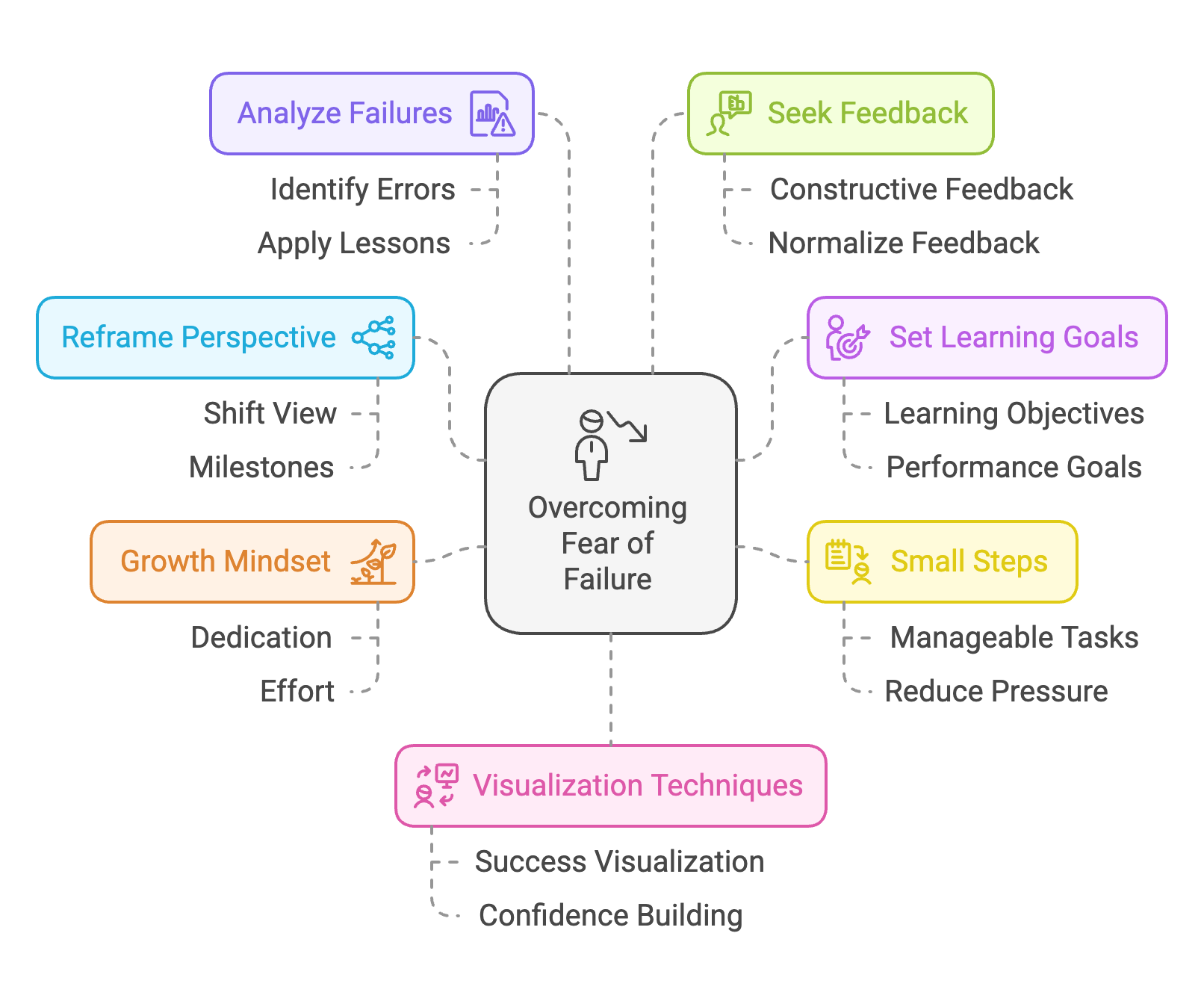Resilience in Action: Overcoming Common Setbacks with Science
The road to achieving your goals is often paved with challenges that can tempt you to throw in the towel. Recognizing these roadblocks is the first step to overcoming them, ensuring that you stay on the path to success.
This article isn't just about identifying why people give up; it's about using a unique blend of business acumen and neuroscience to provide practical, brain-based strategies to push past these hurdles.
Whether you're a startup founder, a rising professional, or a seasoned leader, these insights are designed to empower you and transform the way you approach challenges.
Reason 1: Fear of Failure
The fear of failure is a formidable foe in the world of business and professional growth. It's not just about the worry of not succeeding; it's about what that failure represents – loss of investment, credibility, and self-confidence.
This fear often stems from our brain's natural tendency to overemphasize negative outcomes. It can paralyze decision-making and action, making you overly cautious or stopping you from taking necessary risks. In extreme cases, it leads to a phenomenon called 'analysis paralysis,' where you're so worried about the potential outcomes that you can't make any decision at all.
Start by shifting how you view failure. Instead of seeing it as a negative endpoint, view it as a crucial step in the learning process. Every successful entrepreneur has faced failures – they are milestones on the road to success.
Instead of focusing solely on the end result (like hitting a sales target), set goals related to learning (such as improving sales techniques). This way, even if the end goal isn’t met, you still achieve a learning objective.
Break down big, intimidating tasks into smaller, manageable ones. This reduces the pressure of failure on any single task, making it less daunting to initiate action.
Cultivate the belief that abilities and intelligence can be developed through dedication and hard work. This mindset values effort and learning, making the fear of failure less paralyzing.
When failure does occur, use it as a learning opportunity. Analyze what went wrong, what could be improved, and how you can apply these lessons to future endeavors.
Regularly seek constructive feedback. This not only provides valuable insights for improvement but also normalizes receiving and acting on feedback, which is essential for growth.
Practice visualizing success. Neuroscience shows that our brain often can’t distinguish between vividly imagined scenarios and real ones, reducing anxiety and building confidence.
Reason 2: Lack of Clear Goals
A lack of clear goals is like setting sail without a map; you might move, but you're unlikely to reach your desired destination. This absence of clarity leads to a lack of direction and motivation, two critical drivers in any professional journey. When goals are vague or undefined, it's difficult to measure progress, stay motivated, and maintain focus. This lack of specificity can lead to aimless effort, where energy is expended but little is achieved. Neuroscience tells us that our brains thrive on clear, tangible objectives; without them, it's challenging to trigger the reward mechanisms that fuel motivation and satisfaction.
Embrace the SMART framework for goal-setting. Make sure your goals are Specific, Measurable, Achievable, Relevant, and Time-bound. This framework provides clarity and a tangible roadmap to follow.
Large goals can be overwhelming. Break them into smaller, more manageable tasks. Each small success triggers the brain's reward system, keeping you motivated.
Create a vivid mental picture of your goal and the steps needed to achieve it. Visualization activates the same neural networks that actual task performance does, enhancing your ability to achieve these goals.
The simple act of writing down your goals increases your commitment to them. Keep them visible to constantly remind yourself of what you're working towards.
Set regular intervals to review and adjust your goals. This keeps them relevant and adaptable to changing circumstances.
Share your goals with someone you trust. Accountability can significantly increase your commitment and the likelihood of achieving your goals.
Recognize and celebrate when you hit milestones. This not only boosts morale but also reinforces the positive behavior leading to those achievements.
Reason 3: Inadequate Support System
Reaching professional goals can be tough and sometimes lonely. A weak support system can hurt motivation and strength. A strong network of mentors, peers, or a professional community offers guidance, emotional support, encouragement, and a sense of belonging.
This support is crucial, especially during tough times. Neuroscience shows us that social support can buffer stress and enhance our brain's capacity to manage challenges. Without this network, individuals often find themselves struggling to maintain motivation and perspective.
Identify and reach out to potential mentors in your field. These are individuals who have walked the path before you and can offer invaluable advice, insight, and encouragement.
Connect with peers who are on a similar journey. This can be through professional networking events, online communities, or local meetups. Peers offer empathy, support, and the opportunity for mutual growth.
Join professional associations or groups related to your field. These communities provide a wealth of resources, networking opportunities, and potential collaborations.
Building a support system is not just about what you can get, but also what you can give. Engage actively and be willing to offer help to others.
Use professional social media platforms like LinkedIn to connect with industry leaders, join relevant groups, and participate in discussions.
Schedule regular meetings or check-ins with your mentors and peers. Consistent interaction helps in building stronger relationships and keeping each other motivated.
Events are great opportunities to meet new people, learn new skills, and stay updated with industry trends.
A support system need not only be industry-specific. Sometimes, the best advice and insights come from outside your immediate professional circle.
Reason 4: Burnout
Burnout is a growing problem in high-pressure workplaces. It often happens due to long periods of stress and overwork. When demands become too much for a person to handle, it causes emotional, physical, and mental exhaustion.
This state lowers productivity and creativity and can seriously impact health. Ongoing stress activates the body's 'fight or flight' response, causing harmful effects on the brain and body. At work, burnout shows up as less efficiency, a negative attitude, and feelings of helplessness.
Recognize early signs of burnout, such as tiredness, irritability, low performance, and feeling disconnected from work. Spotting these signs early helps prevent burnout.
Set clear boundaries between work and personal life. Say no to too many demands and resist the urge to always be available.
Participate in activities that recharge you, like exercising, hobbies, or spending time with family and friends. Self-care is essential for your health and productivity, not just a luxury.
Take short, regular breaks during your workday. These breaks are essential for clearing your mind and staying productive over time.
Mindfulness and Relaxation Techniques: Practices like meditation, yoga, or simple breathing exercises can help lower stress and increase mental clarity.
If you find it hard to manage stress and burnout, consider talking to a mental health professional.
Use time management strategies to work smarter. Focus on important tasks, delegate when you can, and avoid multitasking.
Exercise regularly to relieve stress. It keeps you fit and boosts your mental health.
Get enough sleep. Lack of sleep worsens stress and affects your thinking and decision-making.
Keep in touch with your support network. Sharing your experiences can help you feel better and gain perspective.
You have the power to maintain a harmonious work-life balance and overcome burnout by implementing these strategies. Remember, taking care of yourself is not just beneficial for you as an individual; it's also crucial for sustaining long-term professional success.
Reason 5: Fixed Mindset
A fixed mindset is the belief that our abilities and intelligence can't change, which can hinder professional growth and adaptability. This mindset leads to a fear of failure and a reluctance to take on challenges, as people often see failure as a sign of low ability. They may shy away from situations where they might struggle, missing out on important learning opportunities.
However, neuroscience shows that our brains can adapt and develop new skills throughout life, a principle called neuroplasticity. A fixed mindset overlooks this potential, restricting personal and professional growth.
Look for new challenges as valuable chances to learn, adapt, and grow in your personal and professional life.
Recognize that setbacks are a normal part of the journey and use them as opportunities to learn rather than as reasons to give up.
Appreciate the hard work and continuous progress you make much more than any natural talent you might possess.
Accept helpful feedback as a golden chance to improve and refine your abilities.
View the achievements of others as insightful lessons; don’t hesitate to ask how they succeeded and what strategies they employed.
Stay curious and open-minded to encourage exploration, innovation, and continuous learning.
Use affirmations to actively replace negative beliefs with positive thoughts that empower you.
Think about what you have learned along the way, not just the final results.
Always look for innovative ways to grow your skills and expand your knowledge.
Practice mindfulness regularly to better understand, appreciate, and ultimately change your thoughts for the better.
Remember, perseverance and a resilient mindset are key. The power to overcome these obstacles lies within you. Your mindset, more than your circumstances, determines your trajectory.















